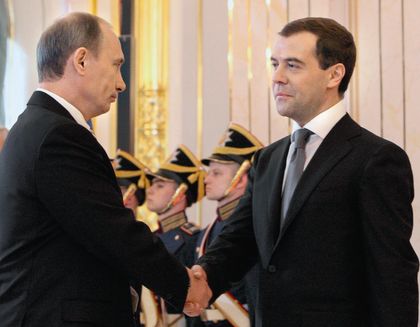Russia is changing. Last autumn, Vladimir Putin resisted the pleas of the “best” milkmaids and turners tutored by the pro-presidential United Russia party to beg him to stay for a third term. The world heaved a sigh of relief, saying, “Bravo, Mr President!” Putin left the No. 1 post in the country, which also helped to work out the muchneeded procedure of changing presidents.
There are numerous nuances, such as what office the president-elect should occupy before the inauguration, how he should be protected and where he should live.
Every line is a pivotal addition to the democratic charter the new, post-Communist Russia is still writing. Everyone in Russia, from the president to ordinary citizens, will need time to get used to fully abiding by democratic norms. After all, the well-worn saying that in Russia there is one law for the rich and another for the poor still holds true.
Putin is believed to have introduced one more element in the country’s democratic development. When United Russia, which has a constitutional majority in the federal parliament and in almost all regional legislatures, endorsed himas its chairman at its congress in April, the Russian parliament received not formal, but real access to power. Russian political parties that win the elections now have a chance to form a majority government, just as in the traditional democracies.
Putin commented on the event, “When the head of the executive power becomes the leader of a party, it is a civilised and natural practice traditional for democratic states.” Despite these positive shifts, the main question – who will be No. 1 in the Russian system of power after Medvedev’s inauguration – remains unanswered.
Some political experts describe the change of power in Russia as a castling.
And they have reasons to do so. Formally, Putin resigned and took up the second post in the country’s power hierarchy.
On May 8, the Russian parliament cleared his nomination for prime minister. The former president accepted this position immediately after the parliamentary election in December. He also said then that he would not encroach on the president’s powers or try to expand his functions.
So far there are no plans to amend the Constitution in order to limit presidential powers. But the changes that have already taken place in the Russian power structure did not need any amendments to it.
Immediately after the presidential election on March 2, the presidential plenipotentiaries in the eight Russian districts, previously accountable to the Kremlin administration, were subordinated to the prime minister. The institution of plenipotentiaries is a powerful structure that allows controlling all regional and municipal bodies of power. Moreover, the incumbent plenipotentiaries, appointed by Putin and loyal to him personally, will have priority over all regional representatives of federal ministers and agencies.
Formally, the president (DmitryMedvedev) has the right to dismiss the prime minister (Vladimir Putin) at any moment without even the parliament’s consent. However, since United Russia has a constitutional majority in parliament, its leader (Putin) may take advantage of the situation if this happens. As the leader of the ruling party, he may either initiate the president’s impeachment, introduce amendments to the Constitution that will reduce the president’s role to purely ceremonial, or eliminate the president’s post altogether, turning Russia into a parliamentary republic headed by prime minister.
It was no coincidence that parliament speaker Boris Gryzlov recalled at the party congress that Putin was also the “national leader,” the “chief,” although this term had not been used in Russia since Stalin in order to avoid any allusions to him.
Nevertheless, Putin is positioned as the true chief of the country whose authority prevails over all formal structures.
So, who will be the first person in Russia, given all these circumstances? The answer being obvious, I would not, nevertheless, Few people paid attention to what Medvedev said at the United Russia congress when supporting Putin’s election as the party leader, “Carried out, this proposal will create a consolidated and really strong political power, a power we have never had. This power will be able to guarantee implementation of ambitious plans to modernise the economy, the social and cultural sectors of the country.” The tandem we are discussing is a temporary phenomenon, both from the individual and political points of view. But at present it is a team, and a tightly consolidated one. This was evident in Red Square during the Victory Parade onMay 9. It is remarkable that the team decided to celebrate its victory on the Russian political scene in this particular manner.
However, after celebrations, there always come workdays, which do not promise any glorious victories yet. The new president will have to address many problems, first of all, demographic ones.
Russia’s population is falling fast. According to UN experts, the country’s population will diminish by one third by 2050, to not more than 100 million. It is hard to say how this will affect Russia’s survival as a single nation, but it will certainly not help.
Fluctuations in energy prices, growing inflation and the global financial crisis aggravated by the food crisis may force the new Russian leaders to seriously amend the Putin Plan. How the new president and the new prime minister deal with these problems will determine both Russia’s fate and their political future.













